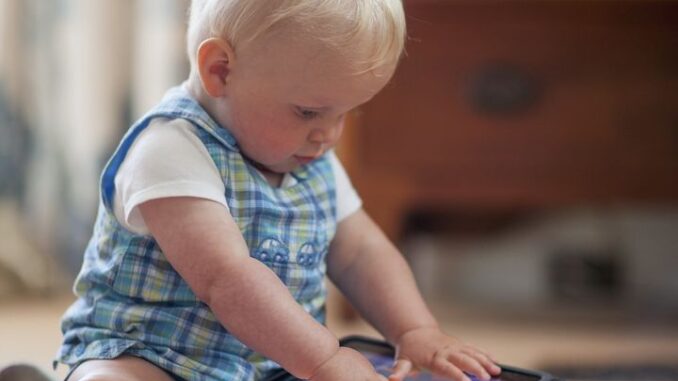
By Shea Stevenson
Recently, I saw a toddler in a stroller dexterously navigating his father’s phone. I can only assume that he was typing, or some similar precise repetitive action, but it was in no way random or simple: this baby knew what he was doing. There is an implication of time that comes with all forms of expertise. How much time has this toddler already spent doing this? The thought creeped me out.
A half-remembered anecdote comes to me about a mother whose child, when she asks for her mother to do something, prefaces the request with “Alexa…” as if she were talking to the Amazon shopping machine. This, too, is creepy to me. Why are these things creepy? Why, when I talk about these babies, are others also ill at ease?
These kids (I’ll call them “iPad babies”) are already given a lot of grief. We hear that teachers don’t like them, we look at them like they’re weird, and they are attached inextricably to phones and tablets, a category of object that is both omnipresent and roundly despised. To cut a long explanation short, this is why iPad babies scare us: we don’t like ourselves, societally, very much these days (I know I don’t!). This is easiest to take out on the people who most sincerely partake in our technologies, literally knowing nothing but what is put in front of them: the kids.
The word “technology” is nowadays mostly associated with electronics and digital tools, but step back for a moment and consider the idea in its totality. Words are technology, clothes are technology, and everything by which you get and understand these words are tools (physical or otherwise). When animals make tools to suit their own needs, they enter a two-way street: they will create a tool, and henceforth, the tool will recreate them for wielding it.
I might make the first automobile, and I design it all to my liking, but now I am thirsty for roads. Not just dirt trails; I need bricks and stone and asphalt, flat ground. Now I need gas stations to dot the landscape so I can use the thing. Now I need a driveway for it. In fact, I need somewhere to park it literally everywhere I take it. Now, even if I could get somewhere by walking, I might as well drive, or what was all that work for making a car? We have designed the object, but the ways in which the object “wants” to be used, the ways in which it is best utilized, carve themselves into our landscape and our own habits like desire paths through a patch of grass.
In a far broader sense, we have made tablets, smartphones, and whatever else the iPad baby is a native to. What do iPads want? It terrifies me to say that I’m not entirely sure, and I don’t think Apple is either, but I’m pretty sure the baby does. Children understand the way technologies guide them on a preverbal level. I have heard from a friend about a child who knew how to type “Barney videos” into YouTube before she even knew how to say those same words.
When we are scared, or angry, or confused about iPad babies, it must be tempered with the knowledge that they are the honest indicators of the world that tech companies have molded. When Alexa uses speech recognition to be a machine servant, it teaches you that some machines sound like people and can do things for you and have no feelings and that this is how you talk to them. Not all of these nuances will hit the babies at once; they will simply see the world and become a part of it. We are scared, then, that we have been bad stewards of the world in some way (I know I am!). I don’t want to say “phones are bad,” but, perhaps, “phones are complicated in ways that I don’t think we can unpack yet, and the repercussions of the dissemination of that technology, as it becomes more and more apparent, will be harder and harder to avoid.”
